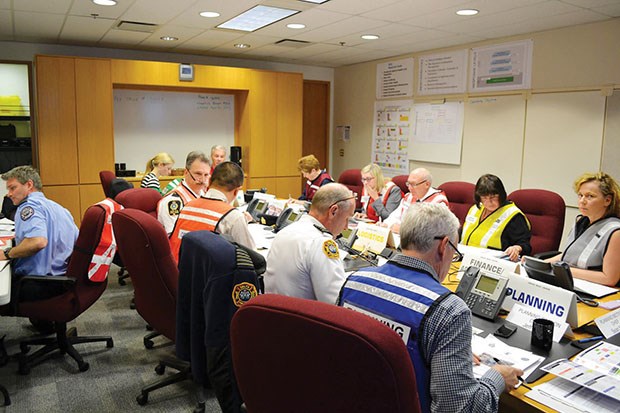Next week marks Emergency Preparedness Week and residents are being encouraged to plan ahead.
"Delta has a plan, has exercised it, and we're challenging the community to make a plan and practice it," said Michel Latendresse, deputy fire chief in charge of emergency management. "It's a shared responsibility and we all need to chip in and do our share."
Residents are being encouraged to take three simple steps to become better prepared to face a range of emergencies - know the risks, make a plan and get an emergency kit.
Latendresse said residents can assess any potential risks by simply becoming aware of their surroundings: Is your home close to the ocean or other waterways that could pose a flood risk, or are there power lines or large trees that could come down in the event of a major wind storm or earthquake? Knowing possible risks, and planning how to deal with them, can help in the event of an emergency.
After assessing any risks, come up with a plan. Have a family plan, an evacuation plan and a communication plan. In the event of a major disaster, such as an earthquake, traditional phone lines could be down, or jammed with people trying to make calls.
Latendresse recommends using non-verbal channels of communication, such as text messaging, email or social media, from a cell phone, which use less bandwidth than making a phone call and are more likely to work when phone service is down or intermittent.
If you only have access to a landline, local phone service may be limited following a disaster. Establish a family contact in a different region (outside the coastal areas of B.C. and the U.S.) to be the check-in person during an emergency.
The third step is to build a kit to help get through the days following a disaster.
Typically, it's recommended to have enough food and water for every member of the family, including pets, to survive for 72 hours. Some items to include may be any needed prescription medications, a spare pair of glasses, blankets and personal hygiene items, such as toilet paper, thermal blankets, matches, can opener, flashlight, rope and tarp.
In the event of a largescale disaster, emergency services could be scarce as the most dire situations are dealt with first. Latendresse said people should be prepared to be self sufficient for 72 hours.
The Corporation of Delta, in cooperation with the fire and police departments, has its own emergency response plan and put it into practice last month. Latendresse said police and fire, along with all the municipal departments, got together to simulate the response in the event of a 6.7 magnitude earthquake in the Strait of Georgia.
"We had the concept on paper, now we needed to validate it," he said. "We know in an incident like this there would be thousands of calls."
Delta's emergency management program is holding two workshops next week for residents interested in learning more about how to be prepared in the event of a disaster.
The workshops are scheduled for Tuesday, May 6 at Kennedy Seniors Centre in North Delta and Thursday, May 8 at the South Delta Recreation Centre in Tsawwassen. Both run from 7 to 8:30 p.m. Advanced registration is required. To register call 604-952-3101 or email [email protected].
Latendresse added staff is available to hold emergency preparedness sessions for groups of people.
For more tips on emergency preparedness visit www.delta.ca/services/public-safety/emergency-preparedness or www.getprepared.ca.



